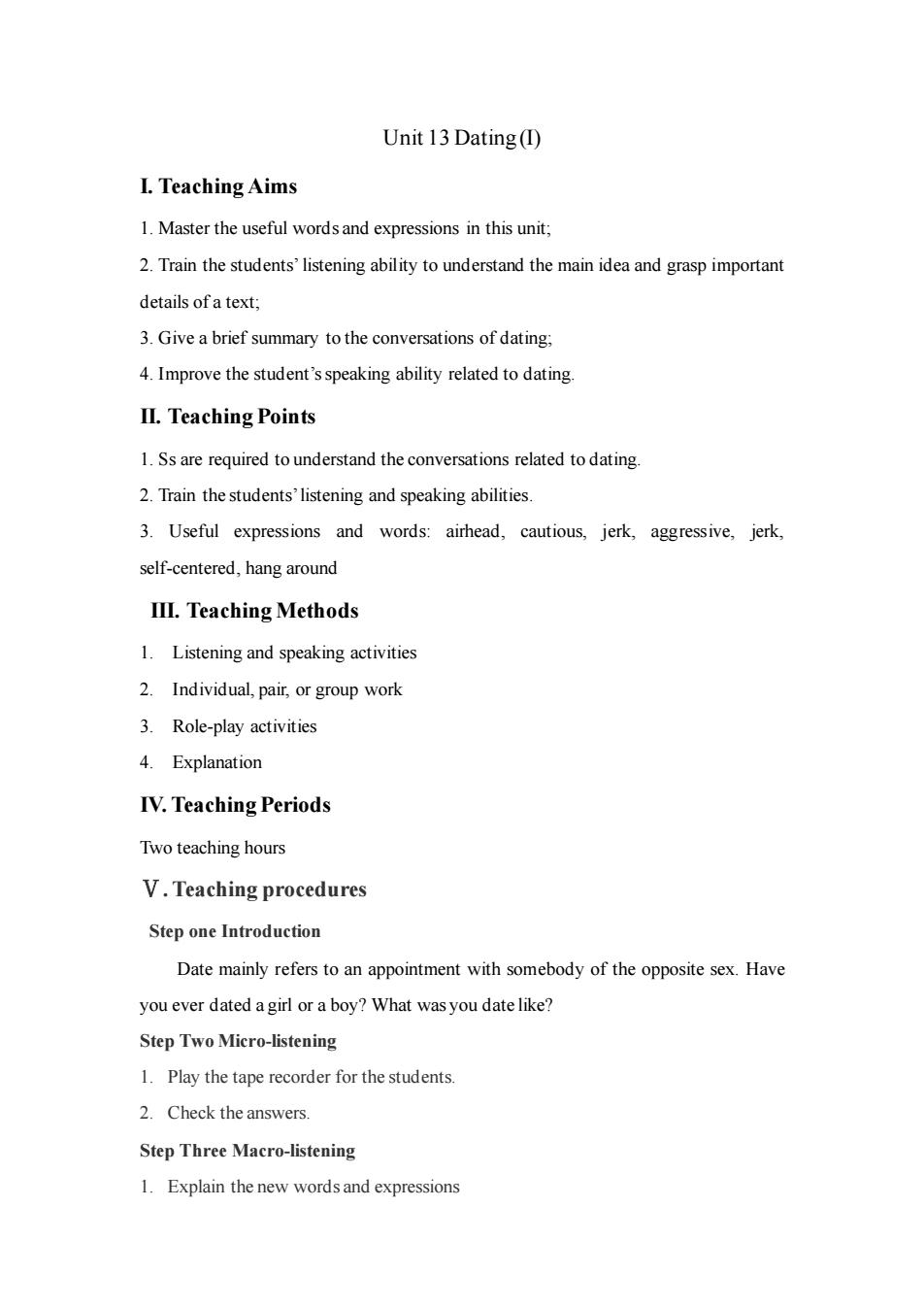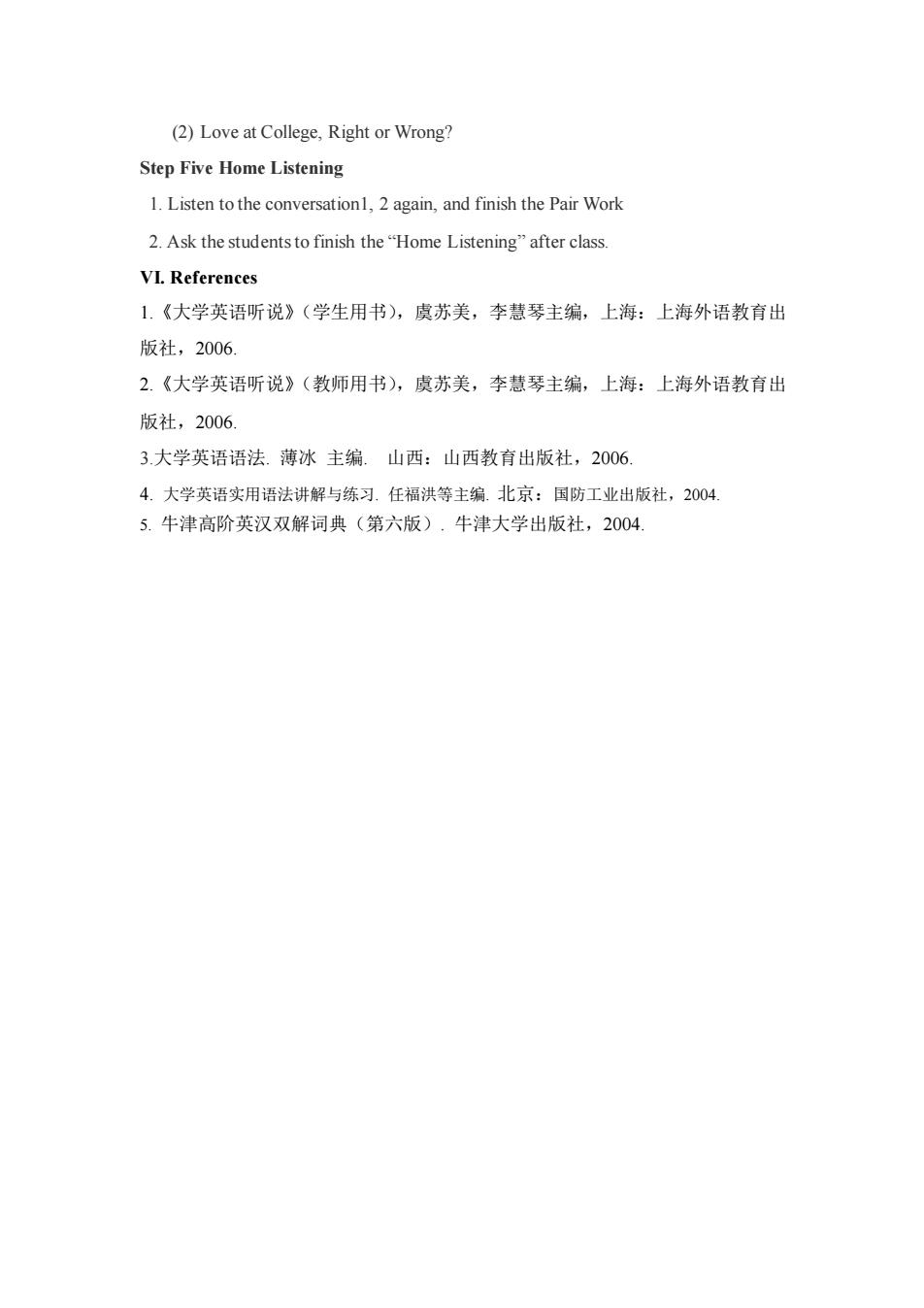
Unit 13 Dating(I) I.Teaching Aims 1.Master the useful wordsand expressions in this unit; 2.Train the students'listening ability to understand the main idea and grasp important details ofa text; 3.Give a brief summary to the conversations of dating: 4.Improve the student's speaking ability related to dating II.Teaching Points 1.Ss are required to understand the conversations related to dating 2.Train the students'listening and speaking abilities 3.Useful expressions and words:airhead,cautious,jerk,aggressive,jerk, self-centered,hang around III.Teaching Methods 1.Listening and speaking activities 2.Individual,pair,or group work 3.Role-play activities 4.Explanation IV.Teaching Periods Two teaching hours V.Teaching procedures Step one Introduction Date mainly refers to an appointment with somebody of the opposite sex.Have you ever dated a girl or a boy?What wasyou date like? Step Two Micro-listening 1.Play the tape recorder for the students. 2.Check the answers Step Three Macro-listening 1.Explain the new words and expressions
Unit 13 Dating (I) I. Teaching Aims 1. Master the useful words and expressions in this unit; 2. Train the students’ listening ability to understand the main idea and grasp important details of a text; 3. Give a brief summary to the conversations of dating; 4. Improve the student’s speaking ability related to dating. II. Teaching Points 1. Ss are required to understand the conversations related to dating. 2. Train the students’ listening and speaking abilities. 3. Useful expressions and words: airhead, cautious, jerk, aggressive, jerk, self-centered, hang around III. Teaching Methods 1. Listening and speaking activities 2. Individual, pair, or group work 3. Role-play activities 4. Explanation IV. Teaching Periods Two teaching hours Ⅴ. Teaching procedures Step one Introduction Date mainly refers to an appointment with somebody of the opposite sex. Have you ever dated a girl or a boy? What was you date like? Step Two Micro-listening 1. Play the tape recorder for the students. 2. Check the answers. Step Three Macro-listening 1. Explain the new words and expressions

()airhead n.asilly,rather unintelligent person设脑子的人 (2)cautious a.careful,.attempting to avoid danger or making mistakes小心谨慎的 (③)jerk n.a foolish annoying person whoalways talks big愚笨古怪的人 (④)aggressive a.showing a strong desire to influence people争强好胜的 ()gentle a.kind,friend and patient温和的,文雅的 (6)self-centered a.interested only in oneself以自我为中心的 ()hang around or kill time by staying at a place for no particular reason消磨时间 2.Play the tape recorder for the students. 3.Ask the students some questions about the conversations. 4.Explain language and culture notes (1)...I haven't really talked to a guy this much in a long time.I haven't had a real talk with a man for a long time.It seems that the girl hasn't had a serious relationship witha man fora long time. (2)I hope I didn't talk too much.The girl was a little uneasy when the man said tha she did talk a lot tonight,which sounds somewhat like a disapproval.She was afraid that the man might take her as someone who usually talks a lot.It is useful then to use"hope I didn't/haven't.."to remedy the situation. (3)The first time we went out the first time we dated (4)...you're just kind of cautious around new people....you're just a little careful when you are with people you don't know well.Here"kind of,same as"sort of means"a little”,“rather”or“in some way' (5)...and hang around together and they spend a lot of time together (on the beach) 5.Ask the students to answer the questions in the book.Lead them to get the right answers and teach them some tips for the listening exercises Step Four Oral Practice 1.Ask the studentstodo the Exercise of"Making Appropriate Responses"in pairs. 2.Give them the following topics to discuss and then ask some students to give personal presentation. (1)My first Date
(1) airhead n. a silly, rather unintelligent person 没脑子的人 (2) cautious a. careful, attempting to avoid danger or making mistakes 小心谨慎的 (3) jerk n. a foolish annoying person who always talks big 愚笨古怪的人 (4) aggressive a. showing a strong desire to influence people 争强好胜的 (5) gentle a. kind, friend and patient 温和的,文雅的 (6) self-centered a. interested only in oneself 以自我为中心的 (7) hang around or kill time by staying at a place for no particular reason 消磨时间 2. Play the tape recorder for the students. 3. Ask the students some questions about the conversations. 4. Explain language and culture notes. (1) …I haven’t really talked to a guy this much in a long time. I haven’t had a real talk with a man for a long time. It seems that the girl hasn’t had a serious relationship with a man for a long time. (2) I hope I didn’t talk too much. The girl was a little uneasy when the man said that she did talk a lot tonight, which sounds somewhat like a disapproval. She was afraid that the man might take her as someone who usually talks a lot. It is useful then to use “I hope I didn’t/haven’t…” to remedy the situation. (3) The first time we went out the first time we dated (4) …you’re just kind of cautious around new people. …you’re just a little careful when you are with people you don’t know well. Here “kind of”, same as “sort of” means “a little”, “rather” or “in some way”. (5) …and hang around together … and they spend a lot of time together (on the beach) 5. Ask the students to answer the questions in the book. Lead them to get the right answers and teach them some tips for the listening exercises. Step Four Oral Practice 1. Ask the students to do the Exercise of “Making Appropriate Responses” in pairs. 2. Give them the following topics to discuss and then ask some students to give personal presentation. (1) My first Date

(2)Love at College,Right or Wrong? Step Five Home Listening 1.Listen to the conversationl,2 again,and finish the Pair Work 2.Ask the studentsto finish the"Home Listening"after class. VI.References 1.《大学英语听说》(学生用书),虞苏美,李慧琴主编,上海:上海外语教有出 版社,2006. 2.《大学英语听说》(教师用书),虞苏美,李慧琴主编,上海:上海外语教育出 版社,2006. 3.大学英语语法.薄冰主编.山西:山西教有出版社,2006. 4.大学英语实用语法讲解与练习.任福洪等主编.北京:国防工业出版社,2004 5.牛津高阶英汉双解词典(第六版).牛津大学出版社,2004
(2) Love at College, Right or Wrong? Step Five Home Listening 1. Listen to the conversation1, 2 again, and finish the Pair Work 2. Ask the students to finish the “Home Listening” after class. VI. References 1.《大学英语听说》(学生用书),虞苏美,李慧琴主编,上海:上海外语教育出 版社,2006. 2.《大学英语听说》(教师用书),虞苏美,李慧琴主编,上海:上海外语教育出 版社,2006. 3.大学英语语法. 薄冰 主编. 山西:山西教育出版社,2006. 4. 大学英语实用语法讲解与练习. 任福洪等主编. 北京:国防工业出版社,2004. 5. 牛津高阶英汉双解词典(第六版). 牛津大学出版社,2004